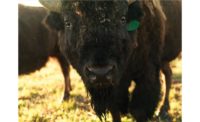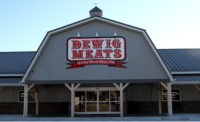Making meat a hero product

Every once in a while, a product comes along that disrupts an entire segment of the consumer product goods industry. It creates a new demand, raises consumer awareness and spurs others in that segment to change the way they do business. The makers of the EPIC meat bar disrupted the meat snack sector and helped it become one of the fastest-growing segments of the meat industry. Not only did it introduce the concept of the meat bar to a market that was dominated by jerky and meat sticks, but it also raised consumer awareness in the segment as a whole.
The co-founders of EPIC Provisions have returned to the industry with a new line of products and a new approach in the meat industry. Force of Nature, based in Austin, Texas, has introduced a new line of ground meat products that goes a step beyond grass-fed or pasture-raised. These products are designed to promote regenerative agriculture.
“Our mission is to reclaim the legacy of meat. What that means is we are getting behind making meat a hero product in an industry where for a really long time, it’s been vilified,” explains Taylor Collins, co-founder of Force of Nature and chief bison wrangler. Some of that vilification can be justified, he adds, as industrialized, commoditized meat production can have environmental ramifications. Force of Nature operates under very different principles.
“What we are doing is we are focusing on creating a supply chain and providing consumers regenerative meat and regenerative-sourced meat. That means those animals and the land on which they were raised are managed in a way that simulates how natural ecosystems work,” he explains.
Force of Nature comes along at a time when more consumers are tying their consumer goods purchases to their own beliefs and values. They want to support companies that have the same belief systems that they do, and support the same causes that they support. Consumers are being told that the meat industry is hurting the environment, and it has led to the rise of plant-based proteins and other alternatives to traditional meat products.
Robby Sansom, co-founder/CEO/land steward, says that consumers are looking for products that are environmentally safe, but it’s unrealistic to expect people to pore over books and studies to learn about regenerative agriculture.
“We can synthesize that information and get these concepts out through an incredible, convenient and approachable platform,” he adds. “If we can get consumers up to speed with the truth and ensure there’s distribution of the product, whether it be retail or your favorite restaurant or online, then we’re going to have the product available for you to buy that supports the systems that align with your values.”
Collins and his wife, co-founder Katie Collins, have seen the meat industry from all sides. They were dedicated vegans until they started suffering from health problems that were tied to their diet. Katie, at 21, was told that she would need a total knee replacement. By adopting a diet that incorporated meat protein, they were able to resolve their health conditions. The Collinses know, then, the benefits of eating meat, but they also want meat that avoids the pitfalls of the industrial meat process. Force of Nature aims to provide the health benefits of meat with the environmental benefits of regenerative agriculture.
Regenerative agriculture, as the company’s website (www.forceofnaturemeats.com) describes, works as follows: “Through properly managed grazing, ruminant animals can improve soil health, stimulate deep rooted grasses, increase biodiversity, propagate seeds, aerate soil, and sequester atmospheric carbon.” In other words, animal agriculture is a necessary component of preserving and restoring nature and not an enemy.
The initial products under the Force of Nature brand are items like ground bison, ground venison, ground elk and ground wild boar. The company’s ground beef is called an “Ancestral Blend,” meaning it includes beef trim, beef heart and beef liver in the formulation. Collins notes that it made no sense to start with the typical ground beef, pork and chicken products, as that market is over-saturated already.
“We intentionally selected very unique proteins that most consumers haven’t had the opportunity to trail,” he said. “We wanted to introduce consumers to something different, but that ground meat platform is the least intimidating, most user-friendly and most versatile. If someone’s never had venison before, it’s really challenging to screw up a venison burger or a meat loaf or tacos.”
The product was introduced at the Annual Meat Conference, held earlier this year in Dallas. The website was officially launched last month, and the products are rolling out to retailers, distributors and foodservice operators now. Consumers can also order products through the company’s website. In addition to the ground meat products, people can order bison tenderloins and short ribs, as well as turkey and chicken. Bison burger patties and venison patties are coming soon. If consumers do want to read more information about agriculture, books about regenerative agriculture and sustainable meat production are also for sale.
The niche for meat items beyond the Big Four proteins of beef, pork, chicken and turkey is relatively small, but there is a supply out there. It just requires a brand that puts the entire supply chain together. It’s something that the co-founders have experienced, through their work in bringing the EPIC bar to market.
“We understand those issues and the challenges they face, we can help them with the obstacles and hurdles,” Sansom notes. “Those hurdles aren’t so great that they can’t be easily overcome; it needs someone like us to create a large brand that can create that scale and awareness.”
Collins notes that the supply of animals and the ranchers is larger than one would think. There are so many wild boar in Texas that the state’s secretary of agriculture has proposed plans to poison then to cull the numbers, which Collins notes is a terrible idea. “We can tap into that resource and save it, because it’s a nutrient-rich, delicious food. If we can convert that into something that feeds our consumers, that’s a win-win,” he says.
Similarly, small farmers and ranchers are facing financial crises and are being squeezed out by the corporate agriculture structure. If Force of Nature can connect with those multi-generation farmers, they can create a harmonious relationship. Force of Nature gets the meat supply it needs, and the farmers are compensated for their agricultural stewardship and can continue to improve their processes.
“The supply chains are there, and we’re figuring out how to put them together on a larger scale,” says Collins.
Looking for a reprint of this article?
From high-res PDFs to custom plaques, order your copy today!






